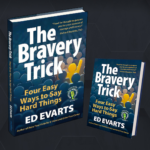Many of the leaders with whom I work desire to lead more and do less. I don’t mean to create easier work; I mean to let their team make their own decisions and solve their own problems. By doing so, the leader builds the skill set of their team and find that they can lead more and manage less.
Yet, many leaders find this a hard thing to do. They have often risen through the ranks and one of their key skills has been to problem solve hands-on. “Solving problems takes up too much of my time. How do I let go of something that helped me be successful?” Here are a few key steps you can take to help you move from problem solver to leader.
- When a team member comes to express concerns regarding another colleague, ask the team member if he has first spoken with the colleague to share the concern.
- If the team member says yes, the leader should inquire how she can help. The team member may not feel that progress was made and is seeking additional help.
- If the team member says no, the leader should instruct the team member to share his concern with his colleague first.
- If the team member is worried about sharing his concern with his colleague, the leader should ask about the concern(s) and do what she can to ensure her team member that having a direct conversation with his colleague is a great place to start.
- If the team member feels this is a great idea, this is where the leader still owns the next step. The leader needs to let her team member know that she is excited that the team member is going to speak to his colleague and to let her know once the conversation has occurred.
- By closing this loop, the leader can ensure that the conversation has happened and the conversation has not “died on the vine.”
- If the team member does not get back to her within 1 – 2 weeks, the leader should follow-up with her team member to assess the status of the conversation and craft next steps, if necessary.
By making sure an important conversation between team members has happened, the leader has helped to solve a problem by building the skill set of her team, while not attempting to solve it herself. That’s great leadership!







